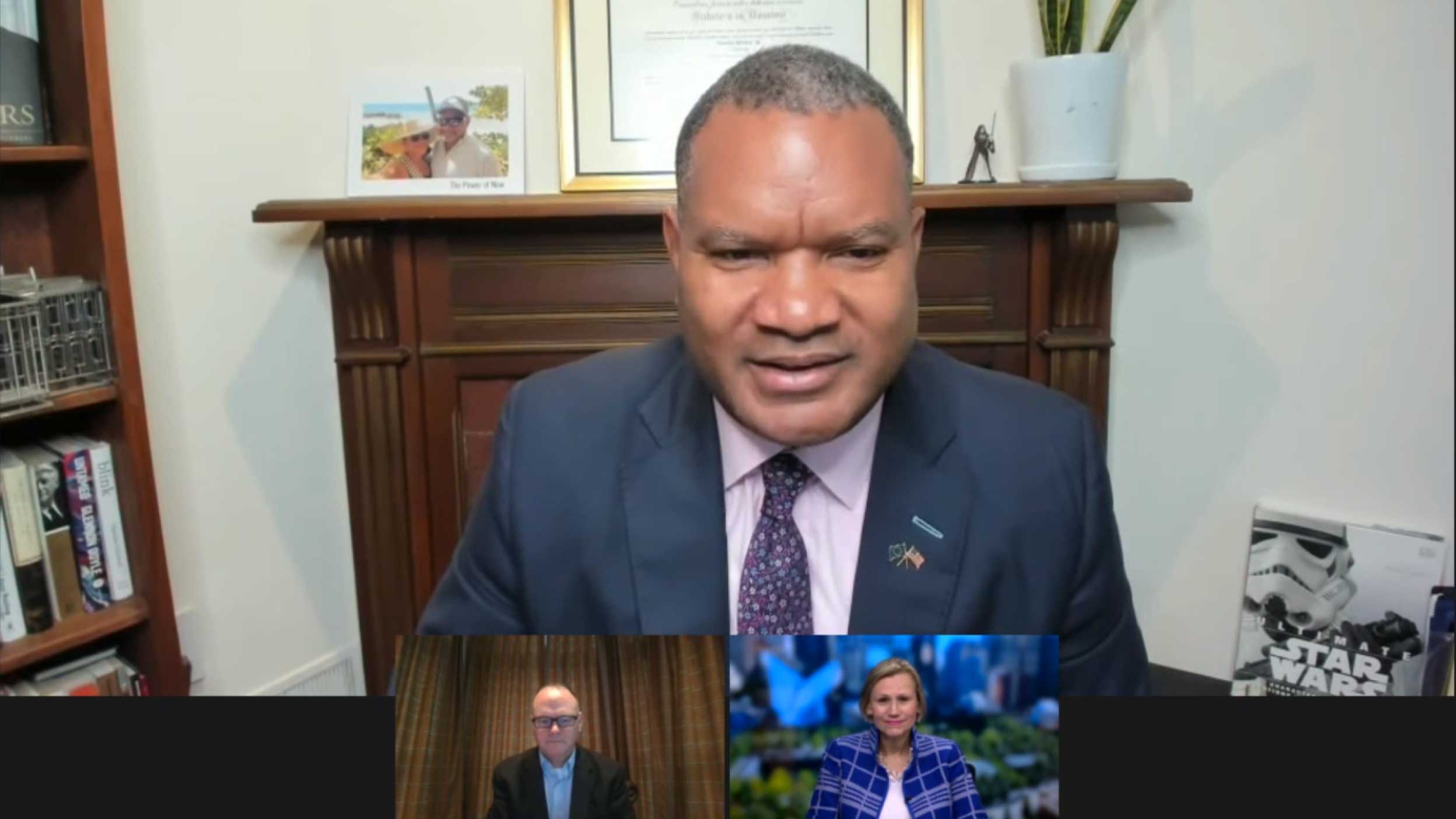
Monthly Market Roundup
In our monthly market roundup for September, Invesco experts review a mixed month for global equity markets, alongside key updates in fixed income.

If deportations of immigrants become widespread, it could have an inflationary impact.
Trump’s tariff and trade negotiations could contribute to market volatility, as seen in his first administration.
More liquefied natural gas terminals in the US could provide Europe a different option for energy.
The votes have been counted. Trump has won the race to the White House and his party has control of Congress, but what do the results mean for investors? How will his policies play out for the economy and markets?
In the last of our US presidential election webinar series, Invesco’s Andy Blocker talks to Invesco’s Kristina Hooper and former Trump Deputy Chief of Staff Rick Dearborn about Trump’s proposed policies and the impact for investors.
Read our key takeaways for the highlights and watch the webinar replay to see the full conversation. (Passages below have been edited for length and clarity.)
Rick Dearborn: This will be a phased approach. Trump’s “border tsar” Tom Homan, the president, and his team will focus on the folks who've entered the country that may be part of cartels. Those that have criminal records in their home countries and have broken US laws. That's going to play out for the first six to nine months. But this is easier said than done.
They're going to have to really sit down and think about how we will approach immigration for the US moving forward. We’re a country of immigrants. We always have been. So, he needs to think about a smart strategy to welcome and keep those individuals that contribute to the US and want to achieve their dreams. It's a difficult, sticky issue.
Kristina Hooper: When it comes to immigration, that's a bigger concern for me than tariffs in terms of its inflationary impact.
We know that the labour market is already very tight, and we know that there have been significant wage pressures in the service industry. So, hopefully it will be just deportation focused on criminal gangs, and it's not going to be very broad.
But if we get to the point where there really is deportation of 15 to 20 million people, many of whom are part of the service industries, that could be very problematic in terms of wage and overall inflationary pressure. So, the jury's still out.
Rick Dearborn: There's a lot of unfinished business. This is a president and an Office of the United States Trade Representative (USTR) that are more interested in bilateral discussions than multilateral treaties, that prior presidents have worked through.
And I think he wants to start that conversation with President Xi of the People’s Republic of China. He wants to have these conversations with other countries and talk about what type of tariffs they have on American goods and services that are coming into their country.
How can we look at non-trade, or non-tariff trade barriers in countries abroad? How can we start a discussion on building access to US domestic manufacturers, and goods and services in these countries?
Kristina Hooper: It sounds like it's going to be a negotiating tool and that tariffs might not even be implemented. So, from that perspective, it really shouldn't have much of an impact, if any on inflation.
But of course, it's likely to contribute to market volatility. What we saw in the first administration was very significant market volatility, and some sell offs along the way as trade negotiations and tariffs were applied. As the situation heated up and at times there was a détente, that really did impact stocks in the US and quite frankly, those impacted Chinese stocks a lot.
So, we would likely see a somewhat similar scenario play out this time. It could create some short-term disruptions. To me the biggest impact is likely to be on markets.
Rick Dearborn: He wants to go from being dependent upon energy imports to becoming an energy independent country and then ultimately becoming energy dominant. His focus on being energy dominant means that you could tie trade and energy together.
He'd love to have the ability to turn to Europe and say, look, you no longer need to rely on energy from countries that may wind up using it as a weapon against you down the road. We're your allies.
Trump has plans to start building out more LNG terminals in the US. He wants to try to cut the best deals he can for the US, work with European allies and provide them a different option for energy.
Long term, I also think he's going to then turn his focus to the Belt and Road, but most specifically all the Pacific Rim countries. He’ll turn to them and say your option right now might be coming from China on energy, but we have an option.
So, energy is going to be a linchpin of his agenda. He’ll probably see it as a legacy of his administration. I do think that there's a lot, with regards to wind, solar and renewables that have a piece to play in this, especially in terms of how you would power a lot of these AI data centers across the US.
Kristina Hooper: So, I think that it's certainly a positive in terms of the impact on the economy. It's going to ease some of the inflationary pressures we might see. But I do think that sometimes what happens in markets can be counterintuitive. For example, in the first Trump administration, there was, of course, a pro energy policy as well.
But interestingly, energy stocks underperformed in that environment relative to how they performed in the Biden administration, relative to how they perform versus clean energy stocks.
And that's because when you create more energy, if you have more supply, all else being equal, then of course prices can go down. So good for people, good for the economy, not as good for energy stocks because you tend to have lower profit margins.
Now, of course, I think Rick rightly points out there's going to be increasing demand. We've got AI data centers, all those things. But, in general, all else being equal, if demand stays the same, we could see profit margins lower and of course, energy stocks not perform as well.
To me, the more obvious play, if we were looking at sectors would be areas like financials, just given the potential for significant deregulation. Also, small and mid-caps, because I do think they're more cyclically sensitive.
What we're going to see coming from the Trump administration, is these pro-growth policies are probably going to amplify an already supportive environment created by Fed easing.
Rick Dearborn: Well in the first administration, he issued an edict, an executive order that said for every one regulation, we would roll back two regulations.
That number, it looks like he's increased to 10 to one. That's easier said than done. It's tough, but it's doable. Things he’ll look for is for regulations that are obstacles to our economy doing well. The obstacles to businesses doing well and to individuals flourishing.
There's one other caveat that I would add that no one's seen before — it's the Department of Government Efficiency. I don't know how it's going to be set up, I do know it involves Elon Musk. I do know he would like Musk to think about how the government could be more efficient. Rules and regulations play a large part in that.
Kristina Hooper: Yes, I think that's fair to say.
Rick Dearborn: My quick answer is, if you're not at the table, you're on the menu. So, you probably want to be part of the negotiations, because you certainly don't want to be served up on a plate by not being part of them. And I think that's true for any country that you have relationships and are trying to do business with.
So, I think you're probably better off trying to work with the administration. This is going to be a very business friendly administration.
Kristina Hooper: So, I think there's certainly concern that we'll be running fiscal deficits that are larger going forward. Hence the significant run up in the ten-year yield. I think also part of that is concerns around higher inflation going forward.
2024 was the first year in which the line item for servicing the US debt exceeded the entire US defense budget. Obviously, that's not sustainable for the long term, but we haven't heard anything about plans to cut the fiscal deficit. In fact, what we've seen are projections that it could get larger.
So, I think there's certainly concern there. I think it's up to the administration to share plans. And perhaps at some point we'll get some indications around, efforts to actually cut the fiscal deficit, which I think could work to the benefit of lowering Treasury yields.
Kristina Hooper: Well, I think that if it's not paid for some other way it’s going to increase the fiscal deficit. So that would be problematic certainly for pushing out yields on the long end.
Rick Dearborn: I think he's got mixed support in the Congress both in the Senate and House. There will be a lot of folks who believe that lowering taxes is the tide that raises all boats, you'll have more revenue come in, we don't have to pay for it.
But you're going to have others in the Senate Steering Committee, which is the conservatives in the Senate, the Freedom Caucus, the House of Representatives, who are going to want to see a discussion about deficits and debt.
But remember, on top of extending the 2017 tax cuts on all with all income brackets, we've also seen campaign promises about no tax on tips, no tax on overtime, no tax on Social Security benefits, no tax for veterans.
All those come with a huge price tag.
With the House now remaining in Republican hands you have a unified government. His ability to craft his message on the tax bill will become easier in some ways and harder in others.
Easier in the sense that he has the Senate, the House and the Presidency, a unified government to build a consensus. Harder because there's lots of voices in that caucus who are going to want a lot of things.

In our monthly market roundup for September, Invesco experts review a mixed month for global equity markets, alongside key updates in fixed income.

Welcome to Applied philosophy, our view on global equity market model sector allocation.

Each month brings a new, easily digestible instalment. Catch up on all things fixed income in under four minutes.


Sign up to receive the latest insights from Invesco’s global team of experts and details about on demand and upcoming online events.